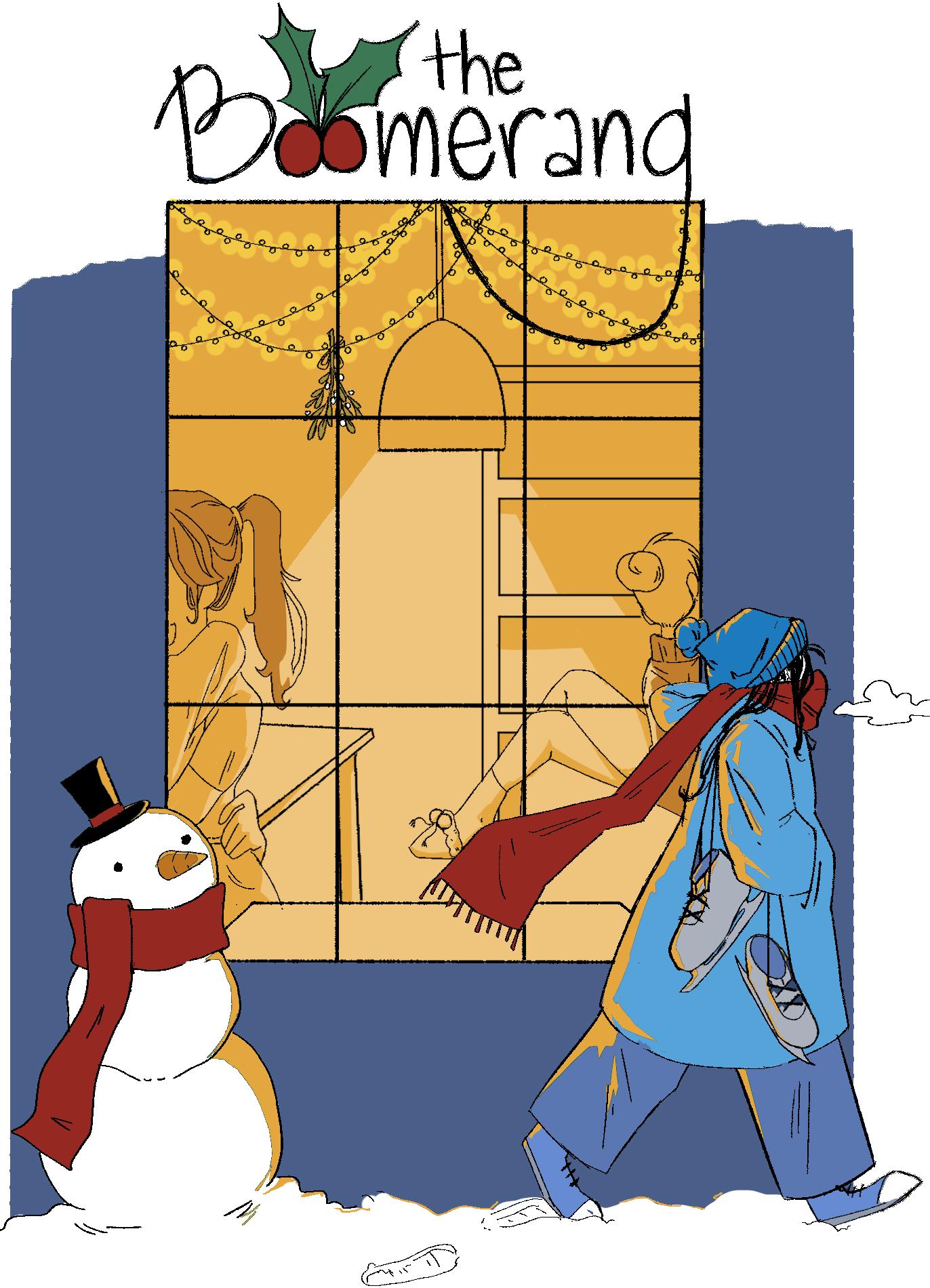

The Life and Wisdom of Our (House) Master
by Ida van Zwetselaar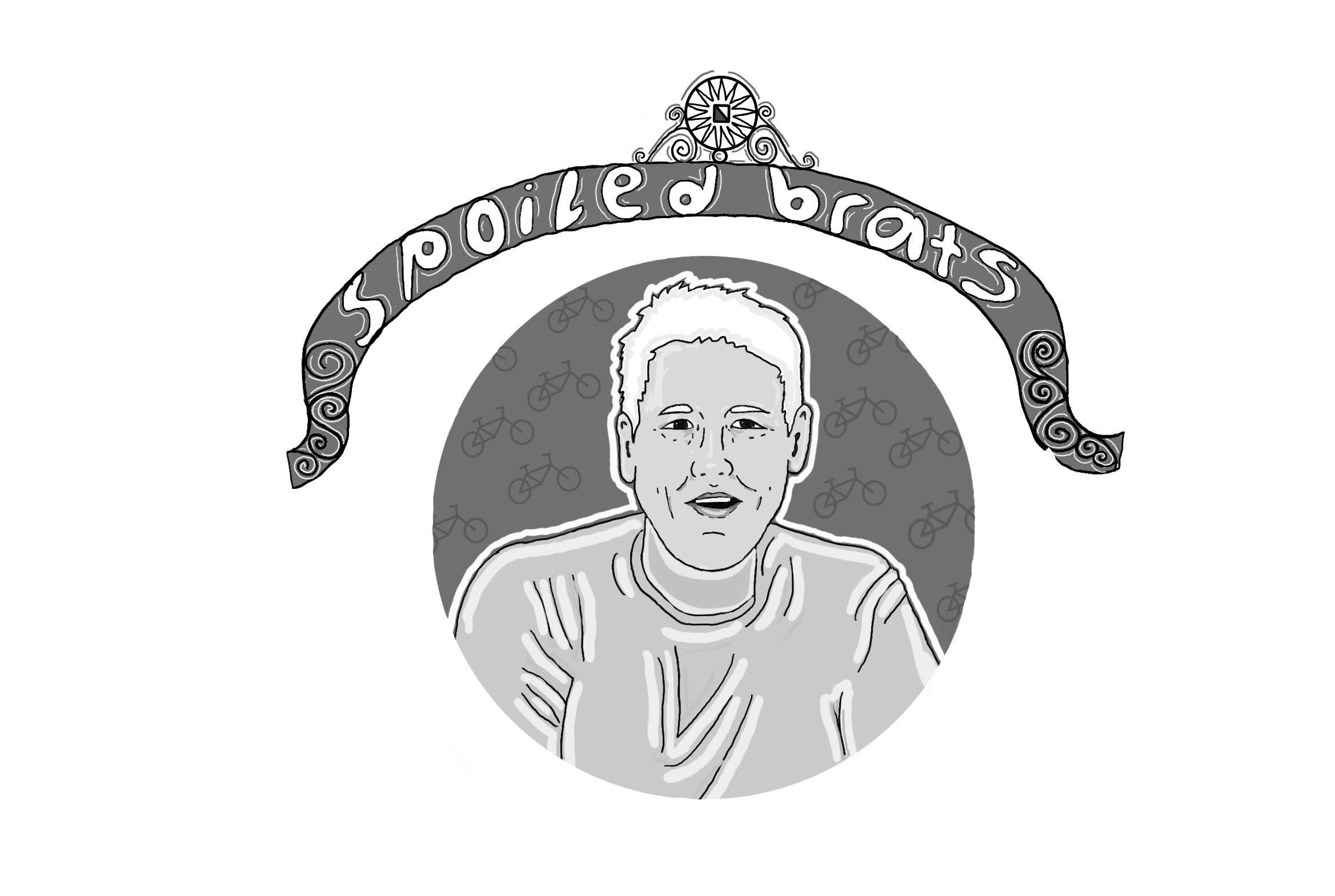
Ever since starting my job at reception, I have been both blessed and cursed by weekly doses of Maarten Diederix, who drops by College Hall on a regular basis to grab himself a coffee, work through his never-ending list of chores, or have a chat with the staff. And trust me, these conversations are more than just getting scolded for ‘forgetting’ about smoking-free campus rules, or placing fire-hazard objects in our units’ hallways. This is the real juicy UCU stuff. He loudly announces his presence when entering the building by singing “it’s going to be a cold, cold Christmas” and then drops a gossip bomb, controversial statement, or hot take on whatever he happens to be annoyed with that day.
As a third-year that has encountered the landlord several times, but mostly perceived him through campus-wide horror stories, getting to know the man as a colleague was conflicting but intriguing. While discussing the fate of all the (hard) drugs he has confiscated over the years and keeps at home, I thought to myself, ‘what a shame it is that the majority of students never talk to this iconic person, nor do they actually know anything about his life’. We mostly see him as a grumpy middle-aged man who shouts in your face and tends to throw around his way-too-problematic views for our predominantly left-leaning campus. Since he’s been here since the very beginning, The Boomerang board decided to send me and Sophie Hudson on a dangerous quest to interview Maarten Diederix. This is but a glimpse into the life and wisdom of our housemaster.
watched Maarten arrive on his bicycle whilst rubbing the sleep from my eyes. We brace ourselves for his company. No way was I going to sit him down to answer an adversarial questionnaire all by myself… “Let’s start with a simple introduction of who you are,” I began, and in under a minute we were already debating the importance of sharing and caring about gender identity and sexuality. I thought that this article would probably end up being a confirmation of all the prejudices we have about him, convinced
that I could predict exactly where the discussion would go. But if that had been the case, this double spread would not have been possible.
Maarten Diederix was born in 1962 in Leiden as the second-oldest son of a Dutch geologist and psychologist. Before moving to different African countries, the four of them lived in a one-room apartment. “So just a reminder to those who find the rooms on campus too small. It’s still a student house. [...] Like, people coming here ‘I can’t live in Wall 1 because it’s too little room’”, he said mockingly. “What does that even mean? You have a bed, a closet, what more do you want?” In fact, according to him, we shouldn’t complain about our living conditions, but acclimatise to these issues instead. You have a cold room? It’s not actually the temperature, but the way you think about it!
I want a kitchen on campus where everyone can come together and cook. I know it’s going to end terribly badly - when Primus or Equites moves in
“Well, if you had to live in one unit on campus, which would it be and why?”. He struggled to answer for a while, but we ended up laughing about the fact that he implicitly admitted not wanting to live in any of them. He says that everyone in Wall has it bad because of the tiny kitchens
point of getting upset about it? “I have lived in five countries, I went to so many schools. I moved so often. I mean, I live wonderfully in a big house. But if I had to leave, I don’t care. I already know that the inside of all the buildings is the same: there’s a wall, there’s a window, there’s a door”.
He told us about when Dining Hall’s catering was still open, and his wish for UCU to be more of an inter-cultural meeting space, not just an academic beehive. “I’ve asked the university repeatedly to say out loud that part of living and studying together is what - is why we are”. It’s what makes our college so special - the opportunity to meet other students from different parts of the world, and to spend three years of your daily life surrounded by them. “I want a kitchen on campus where everyone can come together and cook. I know it’s going to end terribly badly - when Primus or Equites moves in - but I want it more to be about unknowns coming together”. Diederix loves “the concept that you come to a table alone, and within ten minutes you’ll be surrounded by people”. I tried to imagine this, but isn’t it too idealistic for UCU students? Is it perhaps the nostalgia for his own international school experiences speaking?
As a child, Maarten grew up wherever his father’s job took him, from diamond mines in South Africa’s to gold ones in Botswana’s “middle of nowhere”. Later on, in Zambia, he attended boarding school in an English colonial area that was focused on “sports, sports, sports!”, which he loved. It’s not like he had any money to spend on doing anything else anyway. “It was a school of 2000 students, me and my brother were the only white ones [...] Not a word about it would be shared. They didn’t feel it, we didn't feel it”. Sophie asks “When did you start feeling it?”, but halfway through the sentence we get a “Never”. Remarkably, he then brings up how green the colonies in Africa were, and that a third of Chingola used to be covered in golf courses;
“That’s why I’m big fan of the royal family, because they always leave behind their traces, that cannot be
Sophie asked whether Maarten thinks they never saw colour because of the white privilege he has. I internally thank her for being so direct, because it seems hard to communicate with him otherwise. “You keep on saying ‘privilege’”, he responds, “I didn’t have a white privilege, I had money privilege”. “Uh huh, okay…” Sophie and I exchange glances, unsure how to respond. “And why? Because we earned those skills.”
break”. Also, having worked on an oil rig afterwards explains his rough-around-theedges personality.
Let’s try another question: “What do you think of the diversity on campus?”. “I mean, there are too many women,” he responds, “and women don’t appreciate this. This is my personal opinion, but it’s easier to work with a man than with a woman. That is something that all men will say, and half the women.” After attempting to mansplain the meaning of those percentages, he proceeded to recount an anecdote of when the first woman arrived at the oil rig and the entire dynamic changed.
then you’re lucky. But it does influence you, and it makes you so much weaker”. I mean, to a certain degree I agree with this - until he rambles on about upper-class parents corrupting their children’s lifestyles; “when I see one of our UCU students come on campus after the break week by cab, from Schiphol? Then fuck you, you’re dumb!”
When Diederix’s dad tried to enrol his younger brothers in the same school and the headmaster disagreed, they moved back to the Netherlands. “Did he quit his job because he got angry at the headmaster?”. “Yes, I had a strange father”. His parents were very concerned about their children’s education, and any day not spent in school was considered wasted. After completing HAVO, Maarten went to military school, which he tells us about with sparkles in his eyes; “voracious”, “lots of fun” and “a game” are definitely not what I’d have associated with such a place. He is a commando, which explains his loud voice and rigidity. “They want to break you. That is the agreed-upon game. By pushing you so hard in the physical that you lose the mental”. “Do you feel like they ever broke you?” we asked. “No, they can’t. Because there’s nothing to
“In a good way?”, Sophie asked hopefully. “No, no, no! It’s a really manly surrounding. A woman is just not correct - it doesn’t work”. Noticing that we didn’t quite understand his point, he elaborates; “A lot of men chasing her [...] there was never anything sexual in the whole building, and now suddenly there was”. I started to formulate in my head how to tell him that maybe the woman herself was not the problematic factor in this scenario, but I knew that he wouldn't sympathise with my position.
We move on to discussing economic inequalities, as Sophie and I wonder whether growing up abroad changed his perceptions of background-based advantages. “Look, look, look, I think everyone deserves happiness. If you’re born rich,
Sunk Cost Fallacy at Home
by AnonymousTrigger Warning: Depression, Selfharm, Suicidal
Ideation
My whole life circled around money and its absence. A desperate daily search for ways to make money, to have it, to spend it. My mom knew all the credit operators before she learnt to love us.
When I was a kid, I was afraid to vocalize my needs. Once, I got scolded for staying hungry - it was my fault that I was scared that my words would trigger another shout. She would not stop shouting. At me, at her, at him. At whoever didn't give her everything she wanted.
What did she even want from me?
For a long time I tried to make her see me. I was first in class, went to championships. Nothing. Then I stopped trying. I became the embodiment of her problems. I made peace with that I would never hear pride in her voice. The accumulation of guilt for all the world's pain made me even lose my will to live. I firmly felt that I didn't deserve to.
I didn't have a place and the one I'm taking makes the world worse. I was drained of life right in front of her eyes and she still didn't see me. She saw my cuts and still believed she was a good mom.
I only know the colour of her eyes through the reflection of a computer screen. It was her whole world; a fucking machine was better than us. I hated video games. Their existence stole my mother away, swinging her in the arms of the perfect life she'll never have. She was given the illusion that all her problems, her family, which she never actually wanted, was not there anymore. We disappeared into the background of the screen. She would just peek at us every now and then.
Then, high school happened, I found my will to live in helping others. I started doodling a life for myself about others and their needs. My actions became my own and my rebellion another small inconvenience in her life. She didn't have to do anything for most of it, I made sure of it.
In Diederix’s eyes, you do not belong in a cab unless you’ve earned your own money, and only people who have parental financial support as a safety net can consciously be stupid enough not to take the train from the airport to Utrecht. “I’ve never been in a cab”, he boasts. His low opinion on the UCU population is also clear from his views on our lack of personal hygiene, which leads to chlamydia and scurvy outbreaks; “You don’t want bedbugs, I don’t want bedbugs. It’s a collaboration together. And they [UCU students] don’t. Unless they’re beaten into submission”, he chuckles. “Why don’t you guys just use condoms?!” Wise words.
Curious about Diederix’s views on mental health, his Instagram account, and “the shadow people”?
Part 2 coming in February…
I burnt myself alive to see the work of my own hands. Maybe she will be proud now.
With a sore throat and panting, I ran away. I looked around and felt the walls suffocating, my final fall if I don't escape now. I decided for myself, in their disbelief, that I will leave the country for university. She was in pure denial until I got my acceptance note. How do you write a motivational letter if your motivation is survival?
You know those YouTube videos of university acceptance reactions? My mom got the same joy out of saying "I can't afford it, you're not going" before ever uttering a 'congratulations'.
I figured that out myself as well.
I found the money. I booked my own tickets. It was lonely but so was home.
So yes, I hate money.
Even more, I hate myself.
I shouldn't be here.
There are too many women, [...] it's easier to work with a man than with a woman.
“Why don’t you guys just use condoms?!”
Solar Geoengineering: a Non-existent Non-solution
by L. Terzuolo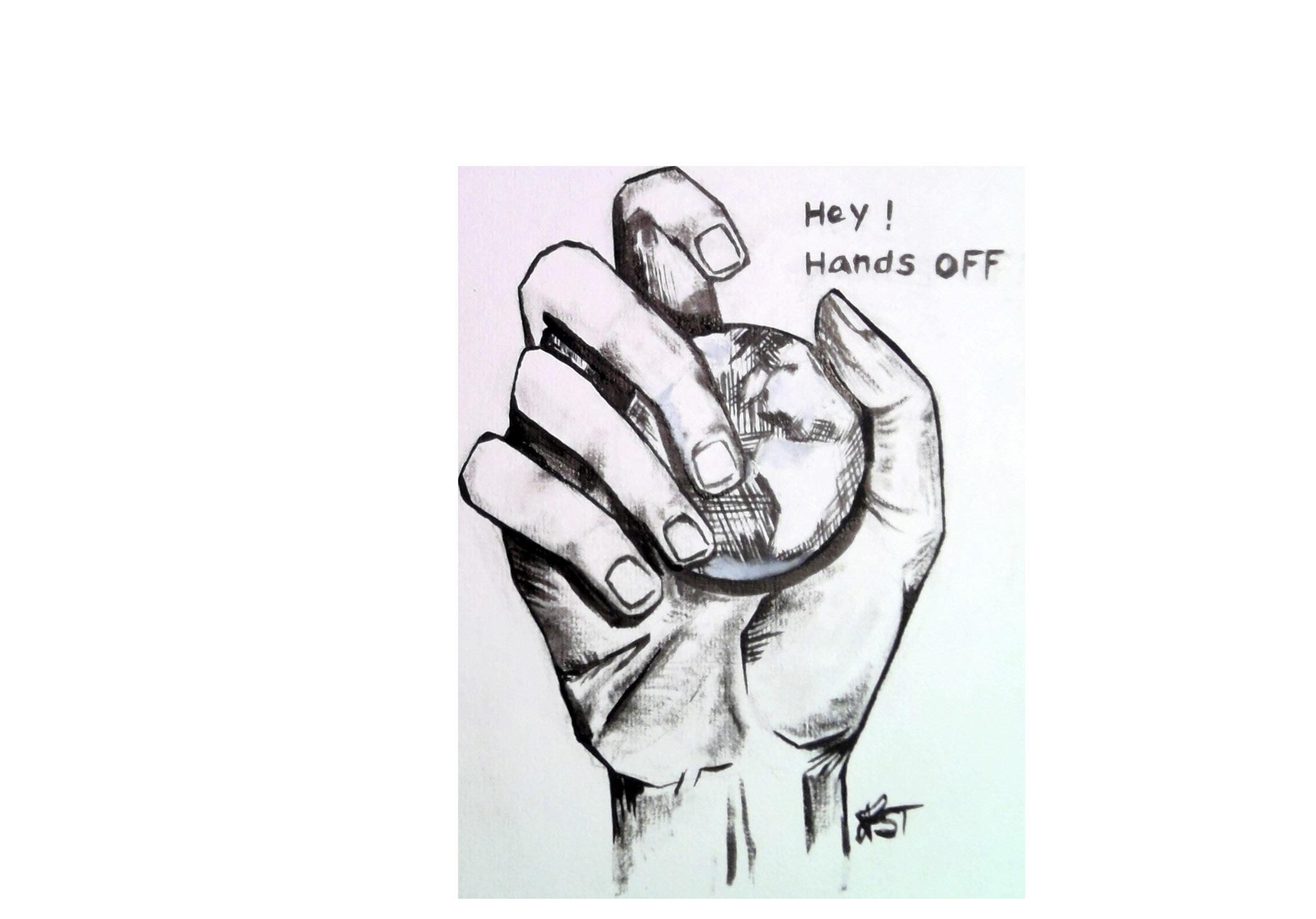
In this unusually warm early November, relay racing with the warmest summer on record, the reality of climate change has manifested itself before everyone's eyes. In this alarming context, it is natural to wish to wake up from this reality as if it were a nightmare, and there are indeed those who hope for quick and painless solutions to the existential threat we face. Among the alleged solutions is solar geoengineering, which goes beyond climate change mitigation and adaptation and embraces the idea of controlling the earth's climate.
Indeed, proponents of the development of this technology (which to date is purely theoretical) claim that extreme heat in the coming decades could be avoided by intercepting the solar radiation reaching the earth (hence the term Solar Radiation Management or SRM). This would be done by a layer of sulphate aerosols injected cyclically into the stratosphere with the function of shielding some of the sun's rays and thus lowering the planet's temperature (Biermann et al., 2022). The idea of SRM comes from the observation that large volcanic eruptions in the past, such as the Pinatubo eruption in 1991, have always caused rapid drops in Earth's temperature, and that this phenomenon can be artificially reproduced.
Why is solar geoengineering a false
late with long-term effects. If we stopped using SRM once started, the warming effect of the accumulated CO2 would result in termination shock - a drastic and sudden and catastrophic rise in temperature. It is also illusory to think that solar geoengineering will buy us time for the ecological transition, and using it means putting ourselves in the position of having to continue forever.
proponents, so the narrative around its use is biassed and downplays its critical issues.
This has serious consequences on policy, because portraying SRM as a 'solution' to climate change provides the rhetorical basis for fallacious and populist political slogans. Once the technology is developed, decisions about its use are unlikely to remain in the hands of scientists, and it could become a tool of economic-political interests aimed at continuing fossil fuel consumption instead of addressing the root cause of climate change.
Finally, SRM risks becoming the subject of huge geopolitical conflicts. As a planet-wide intervention with variable and uncertain regional effects (for example, a likely alteration of the Monsoon), which state or institution would have the right to decide how to use it? Given the heterogeneity of outcomes, what would happen if one country concluded it had achieved too much cooling and another pushed for more climate adjustments?
Why care about the debate if this technology is theoretical and undesirable?
It is important to understand the scien
It also negatively impacts scientific research because science must be falsifiable by nature. The scientific consensus around climate change and reports of the Intergovernmental Panel on Climate Change (IPCC) are based on the existing literature, so as to reflect the possible bias of the scientists researching it. If the publications on SRM are unanimous and positive, its conclusions become unfalsifiable and undebatable.
In light of these considerations, Solar geoengineering is a false simplistic solution to climate change, our most complex problem. If taken seriously, it will be no more than a distraction from our most essential task: decarbonizing the world economy to zero greenhouse gas emissions. It is therefore essential that the scientific community and society at large be aware in order to take an informed position.
With this in mind, the Utrecht-born network of scientists supporting the International Non-Use Agreement on Solar Geoengineering has launched a petition on change.org and published an open letter (which you can read on their website solargeoeng.org) to governments and the United Nations signed by more than 350 experts from over 50 countries to date. At Utrecht University, bachelor’s and master’s students are getting together to organise a Youth Working Group for the
Solar geoengineering is a false simplistic solution to climate change, our most complex problem.
SRM is to date known almost only by its proponents, so the narrative around its use is biassed and downplays its critical
Africa is (Finally) in the News Again
by Ida van ZwetselaarI was looking at my phone exclaiming “Nooo, Kili is burning again!” when someone looked up at me with mild interest in their eyes, so I elaborated. “Mt. Kilimanjaro,” While shoving the photo my family just sent me into his face, “apparently there have been fires on it for days”. A flashback hits of me doing the exact same thing when John Magufuli died and Tanzania suddenly had a female president, or that one time I read about the drastic impacts of global climate change and came across a piece about the summit's rapidly disappearing glaciers. But what’s the point if most people cannot even tell the country apart from its bordering nations, let alone Tasmania, Tunisia, or Transylvania? (Based on true encounters).
I underestimated him though. “Isn’t that, like, the highest mountain of Africa?” he replied, no attention left already. To be clear, it is also the highest free-standing mountain of the world, and embedded in socio-historic, cultural, natural, spiritual, emotional and economic values. Maybe I was a bit too shaken by the thought of my hometown’s landscape going up in flames and wanted to prove something, but with good faith I scrolled straight to the BBC, New York Times, NOS, al-Jazeera, some of those well-known news outlets. Nothing. ‘What the fuck?’ I thought to myself. ‘Where are the live reports that Europe and Northern America received during last summer’s wildfires? And remember when the Notre-Dame was burning?’
I kept checking throughout that week, and one by one, insignificant headlines about the fires caught my eye. However, something peculiar dawned on me. These articles were mostly focused around whether or not the tourists residing on the mountains would be safe, and the fact that firefighting troops struggled to keep the flames under control, so volunteers from the area helped out. More than that, the articles were notably the shortest length allowed for publishing, and all contained identical information: probably the handful that was fed to them by journalists employed at the scene, who likely asked Tanzanian scientists or authority figures for facts.
Isn’t this just a reflection of what they are interested in? The bare minimum?. If it was not for people I know living in the Kilimanjaro region, I would have struggled to find out whether the fires were ever stopped (eventually, they were), what
its causes were (remains unknown, but extreme drought and wind fuelled it), what the consequences are (destroyed biodiversity, amongst others). But then again, if it was not for the people I know there, would I have even cared?
A week later, I was surprised to see Tanzania in global news again with a similarly grim story, this time about Africa’s largest lake: “19 dead after commercial plane crashes into Lake Victoria'' (CNN, Nov 7, 2022). The focus was that Precision Air is a common airline for tourists traveling to their holiday destinations, and that the rescue teams were late and busy removing the airplane from the water with help from the local community. A pattern?
British journalists do not report on ‘white on white violence’ when reporting the conflict in Northern Ireland.” Yeah, think about that.
There is a division - or at least an imbalance - in how pressing information about natural disasters, violence, corruption, and other environmental and societal issues gets portrayed between the West and “the Rest”. These countries apparently are not worth as much attention, despite the fact that these stories need a global stage just as badly and are much more dire than what gets screened on most TV news stations every night.
tell the country apart from its bordering nations, let alone Tasmania, Tunisia, or Transylvania?
Well, it seems that popular media nowadays still tend to echo Western Imperial styles of reporting (as was done by missionaries, social scientists and slave traders) when prioritizing and wording articles about the Global South, often adopting a patronising or delegitimizing tone and selecting only the most gruesome stories to tell, in order to affirm a sense of “Otherness”.

One could argue that such sensationalism based on bad news is key to journalism universally. But, as an example from the essay 'The Western Media and Africa: Issues of Information and Images' helps to illustrate, “‘black on black violence’ is a euphemism the Western press used in writing about South Africa in the 1980s, yet
Common to reportage on Africa as a whole is the narrative of hopelessness (with just a sprinkle of primitiveness). News stories from the continent are usually something along the lines of “terrorist attack this”, “drought/flood that”, and “so many million die of [insert disease] here”, “major scandal there”, etc. African landscapes are either seen as full of dangerous animals or landmines, and its people usually as untrustworthy, poverty-stricken or lazy. How do you expect Tanzanian citizens to attempt to personally transgress these stereotypes, if they’re all that’s sold as truth abroad? Even worse, they have little to no control over how this negative image of them spreads.
I don’t need to tell you how powerful modern media and news outlets are at steering this discourse, creating a homogeneous and racist perception of non-white people and regions where catastrophe appears to be their only reality, this is not true. So here is a call for more accurate journalistic coverage of non-western countries where their achievements - not just constant downfall and devastation - are also documented and celebrated. Because if you pick up a copy of, say, The East African, you would notice that there are always (positive) stories that deserve to be shared, without being tainted by dominant, harmful ideologies.
But what’s the point if most people cannot even
Well, it seems that popular media nowadays still tend to echo Western Imperial styles of reporting.
My Neurodivergence and I
by Ren Carmody-HendriksDisclaimer: my experience with ADHD cannot be generalised to every neurodivergent individual.
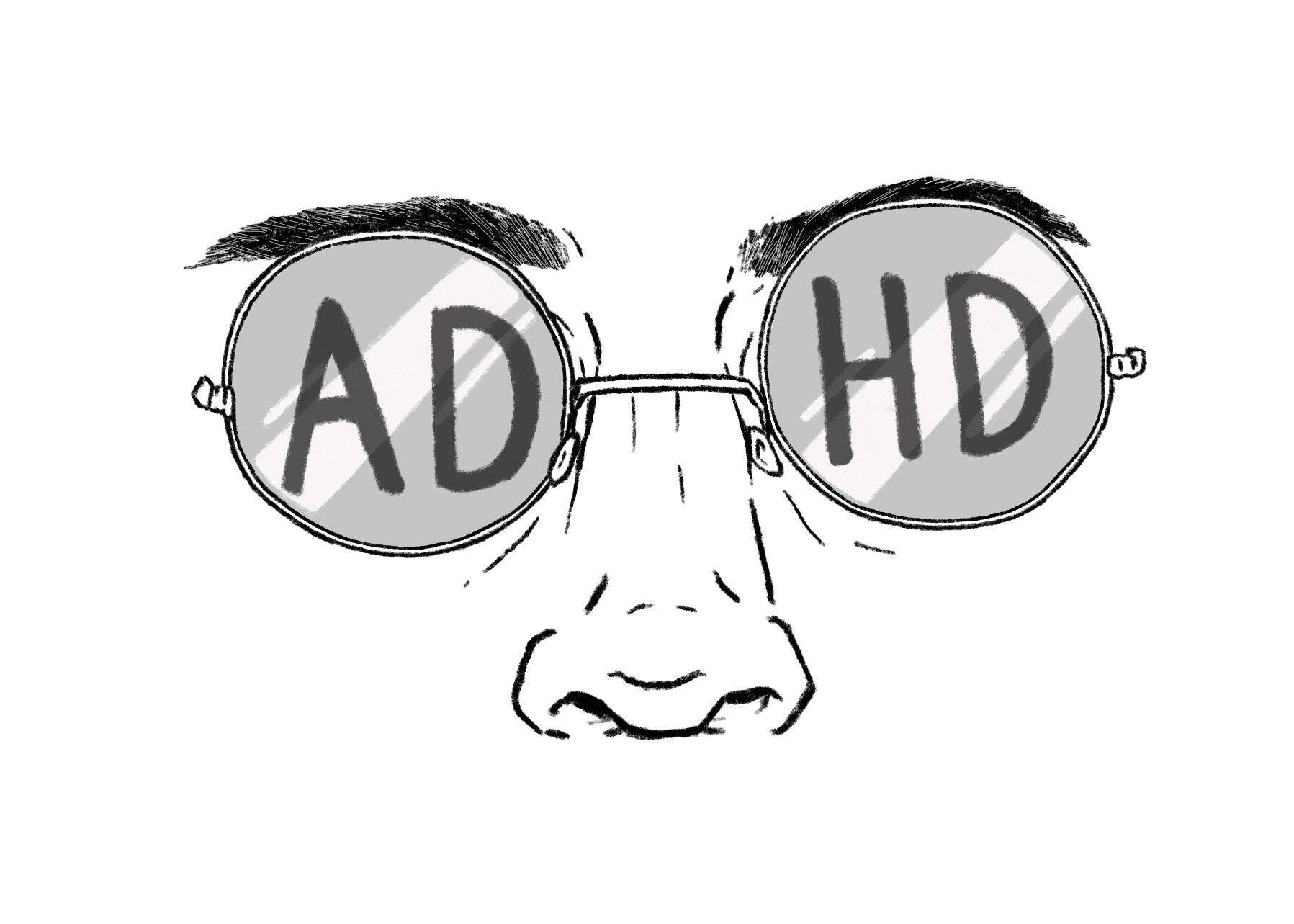
Neurodivergence – a term that refers to variations in the human brain and cognition regarding sociability, learning, attention, mood, and other mental functions. It encompasses a variety of diagnoses - Autism Spectrum Disorder, Attention Deficit (Hyperactive) Disorder, dyslexia, dyscalculia, Tourette's, social anxiety, and others.
We all know at least one person who is neurodivergent, whether you are aware of it or not. Some are very comfortable with sharing their diagnosis, others not as much. I’ve been diagnosed with ADHD, specifically the inattentive kind. The conclusion was finalised in the Summer of 2020 when I was 19, just two months before coming to UCU.
The diagnosis did not change my life. In actuality, it was just a confirmation of the beliefs I have had ever since I was a child – that something was “wrong”, something that felt “off” about myself. The statement “I don’t know” had a chokehold on me then, it was a perpetual lump in my throat, ready to pop out when the unexplainable was asked to be comprehensively explained. It triggered a frustration that unfortunately did not disappear with the diagnosis, rather, one frustration was replaced by another.
When confronted with the facts of life whilst donning a pair of ADHD-tinted glasses, you realise there are small injustices ingrained in many aspects of life. You learn how institutions and social situations have always been slightly against you, and how your struggles are not unfounded. On a personal level, every day offers a new way to confront you with how your ADHD influ ences your interactions, your work effort, your ability to love and be passionate, and your changeability, to name a few.
I don’t want to be defined by my ADHD, but how am I meant to be able to separate myself
from this diagnosis when everything I do is tinged with its colour? There is a shame that always seems to sit on my tongue, the tongue that tells everyone my diagnosis. The shame transforms a simple statement into a confession that reeks of atypical embarrassment and is yet framed as a joke – the need to make ADHD laughable, suggestive of the crippling lack of self-esteem that comes with it.
feel like you are letting others and yourself down, very likely due to your habit of overcompensating to make up for your shortcomings. Frustration follows closely behind these two, because it seems that with every single trouble and struggle, there is a little practical solution paired with it, a solution that forever feels out of reach, despite being so close. It feels ridiculous, watching everyone do a task with ease while you in that moment feel incapable.
It calls for an internal mindset change. One that is softer, more compassionate –one that understands how a neurodivergent way of seeing the world looks different. One that allows you to recognise and reinforce your specific boundaries and needs that keep you from dysfunctional paralysis.
Without the official psychiatric terms, how else am I meant to explain my behaviours? How else am I meant to explain, for instance, that there are days when my tolerance for stress waivers? That sometimes, the slightest sound, sight, touch, or pattern disturbance causes a meltdown. Without these terms that have helped the majority understand and rationalise these atypical behaviours, how else am I meant to get institutions to bend to my will, rather than me bending to theirs?
In these short two years, some of my greatest joys have arisen due to my ADHD-influenced tendencies. I love following where my gut impulsivities can take me, and the imagination that comes with associative thinking, and the spark of passion I feel when I indulge in my interest of the week.
I adore the people I surround myself with – a true safe space brimming with compassion, especially when you stumble upon the coincidence that you are all neurodivergent in some way (a very common and heartwarming experience). Admittedly, it’s been a short two years, and there’s still a lifetime ahead of me, and it’s not always pretty, but I’m trying, and it’s been worth it every day.
Shame and guilt are certainly the keywords that seem to crop up in every discussion concerning ADHD. Shame, because it feels
Sure, it’s tiring, having to put up with the uninformed assumptions and unrealistic expectations from institutions and society – UCU’s mental health department can certainly be better (looking at you, Learning Agreement). It’s a learning process, for both us and those in our lives, but we do what we can within our capacities. We take what we can get, loving and nurturing the people and things in our lives that make us happy, and discarding what doesn’t – ultimately changing the harmful neurodivergent narratives that suffocate us.
The diagnosis did not change my life. In actuality, it was just a confirmation of the beliefs I have had ever since I was a child
I don’t want to be defined by my ADHD, but how am I meant to be able to separate myself from this diagnosis when everything I do is tinged with its colour?
Autism Activist
by Karolien van PulPlease note that this is from my personal experience and not all autistic people experience their autism in the same way.
Whether I chalk it down to being autistic or anxious, I have a hard time attending protests. This sucks because there is so much I want to protest, and so many causes I want to loudly stand behind. I’m talking in this case about protests in the traditional sense; marches through the city, demonstrations, chaining oneself to buildings, signs with slogans and chants through megaphones. But that comes with all sorts of challenges for me; big masses of people, unfamiliarity with my surroundings, shouting and overlapping conversations, so many social cues I can’t read, and a needed ability to act spontaneously or change the course of action if the situation requires it. None of these are things I can handle well on their own, so a combination of all of them at once can knock me out for two days.
In many cases, my body and brain’s responses to these stimuli are considered ‘out of the ordinary.’ I go nonverbal for long periods of time. I dissociate from my surroundings to tune out stressful factors. I have full blown panic attacks. I get overwhelmed by noise and can’t focus on what anyone is saying. I avoid eye contact and lose any facial expression. I get tics and body twitches that can be very sudden and jarring to someone who hasn’t seen them before. All of these possible responses discourage me from attending protests, both for my own sake and that of the protest and protesters around me. Another concern is the presence and involvement of police at many of these events. Too often I read stories about interactions between
police and autistic people escalating because many of the mannerisms I described are mistaken for apathy, non compliance, aggression, or being on drugs. If you want to read more about that, I recommend 'What happens when people with autism interact with police?' by Sean O’Malley (2017, CAMH).
I think I’ve pretty much established that, unfortunately, I can’t really attend these protests. So where does that leave me? It leaves me with three things to think about; other ways I can support causes I’m passionate about, a gnawing bout of imposter syndrome, and checking my privileges.

Starting with my first point, there are many ways to still be supportive. Sharing information about events on social media and in your social circles. If you know the organisers personally, it can be helpful to provide time and resources with the set-up and preparation, perhaps you can financially support a cause. Of course, you can learn about a cause and amplify the voices of those most affected. Additionally, if you, like me, are unable to attend most protests and are unsure how to help a specific cause, ask someone involved. They’ll know what help they need.
than ‘active’ like them. This is also an issue more broadly applicable to being autistic or neurodivergent in general; comparing myself to people around me and their abilities. Without psychoanalysing myself too much in a Boomerang article, this train of thought is not permanent. I do what I can within my own limits, and there's not much more I can do than that. My friends are able to do things differently than I am, which impresses and amazes me everyday, but isn't a reason for me to be harsh on myself.
Lastly, I'd like to point out the role privilege plays in this. Although some of the causes I support do affect me directly, being Dutch and white, a majority of them don’t. Meaning that my survival does not depend on a protest being successful or not. This could make it easier to say ‘Well, that protest is going to be a bit too overwhelming for me, so I’m going to just take a back seat and stay at home for this one’, because at the end of the day it doesn’t change my own life directly. Not everyone has the financial means to donate to a cause when they also have difficulty taking to the streets.
As worried as I might be about police interactions at protest, this is without a doubt something people of colour – and by extension neurodivergent people of colour – deal with more. Although personal safety and comfort are important, in instances where it’s a question between being slightly worried at a protest or staying at home where your comfort, and perhaps complicity, are never challenged, you accept the worry and show up. Demonstrations need people. So those who can, go to protests and use your privilege to help a movement.
Then, imposter syndrome. Something I feel a lot in the activism sphere. I join group chats about organising events and then I rarely show up. I post about protests on my Instagram story that I do not go to when the day arrives. It makes me worry that I’m just being performative and not truly helping. ‘Fraud activist’, my brain tells me. Protests need people, and I’m just hiding behind a screen. It’s a vicious cycle of wanting to do more, not wanting to come across as performative, and not being harsh on myself for realising and respecting my limits. A difficult scale to balance. When I see my friends, many of which are very active in a lot of social movements, my imposter syndrome tells me I’m not really helping the issues I care about because I’m too ‘passive’, rather
My main goal of writing this article is to extend support to other autistic/neurodivergent people who struggle with the same issue. Imposter syndrome and frustration about ability compared to neurotypicals are difficult to deal with. Realising, accepting, and respecting our own boundaries is also tough, and something that takes time. Figuring out how to be the best activist you can be given your capabilities is a skill to develop over time and with experience. Keep an eye out for toeing the line between learning how you best protest, and drawing attention away from the cause. In other words, if you are acting in solidarity, do what you can without centering yourself. Hopefully this has helped someone who is grappling with the same struggles, and provides some comfort. And remember, if you can go to protests, please do.
All of these possible responses discourage me from attending protests, both for my own sake and that of the protest and protesters around me.Illustration © Ida Zwets
Daddy Issues
by Kitty Bertrand“Do you have daddy issues?”
I was asked this question by someone I was ‘seeing’ at the time. I didn’t spend much time thinking about their question before saying ‘No?’ with an audible question mark at the end. I did have issues with my dad, but did that automatically mean I had daddy issues? Later that night, I asked one of my unitmates what she thought. ‘Oh of course you have daddy issues,’ she said almost as quickly as I had asked my question. The justification she gave for her answer made sense, but I wanted to figure out myself what the fuck daddy issues even were, and whether or not I had them.
in their life consistently, this could lead to an insecure attachment style later in adulthood.” Right, okay. So that’s a lot to unpack right then and there. First, I did have a father figure, I grew up with my stepdad from the age of seven. Was that consistent? How does one measure consistency? Seven is so young that having a father figure in your life from then on was surely good enough, right? And then there’s the question: does it matter if the father figure in your life isn’t your dad? Does that make a difference in how you develop emotionally? I also had to google the term ‘insecure attachment style’ because despite having seen it on TikTok multiple times, I didn't actually know what it meant. After a couple of minutes of research, I found that it just meant that you felt insecure in relationships. Finally, something I didn’t relate to.
After understanding that I perhaps do have daddy issues, I decided to give some very wise advice to those who need it, and an explanation to those who don’t relate to this article at all.
Here’s what not to do: I view the love I give as messy. I get attached at a pace that’s inhumanely fast to people who aren’t even real. That’s because I create the version of them that I need them to be. Of course, that’s never who they truly are, and if we’re together long enough, I lose interest and walk away ready to be infatuated by someone else. Take time getting to know someone and please put yourself first, because you will feel broken if they walk away.
Ironically, it took a few clicks before any mention of a father, and until then I kept reading about how women’s poor relationship with men could be defined as having daddy issues. For example, psychology today suggested that “women with daddy issues do not have specific symptoms, but common behaviours include having trouble trusting men and being jealous.” I found this statement extremely objectifying and rejected it.
After all, romantically, I trust way too easily for my own good, and I don’t think of myself as a particularly jealous person. The biggest issue I had with the term ‘daddy issues’ is that despite only speaking to my dad in french, I would never call him the french equivalent of ‘daddy’. In my mind, no one actually called their dad that. For me, the word ‘daddy’ had always been so sexualised. I had never heard that word be spoken with innocence. So, the term ‘daddy issues’ automatically felt like it was yet another way to sexualise women. Also, can we stop and realise that the term ‘daddy issues’ places the blame on the daughters? When will we stop blaming women for what happens to them?
After calming down a bit, I continued with my google search. I learnt from Healthline.com that “if a child doesn't have a father figure
By not having received the love from my dad I wish I had, I thought that love is something you had to fight for. But having fought for over 20 years, I don’t know what the end of the race feels like. So when your crush doesn’t seem to like you back, actively try to get over it. If you’re not receiving the love you deserve from the people around you, have a conversation with them. If they don’t change, leave them behind and find the ones who will.
If you have daddy (or mommy) issues, all your relationships will be greatly affected by it. It will take time for you and your partner to understand what you’re feeling - you have an additional hurdle that many don’t have.

If you have the tendency to trauma dump when you’re starting to get to know someone, you’re most likely trying to bond on a deeper level to make sure they don’t leave you. Whether you do this with potential romantic partners or new friends, you’re putting yourself and your well-being at risk. As my friends have wisely told me, you need to ask yourself whether this person is worthy of knowing such deep and personal things about you before you start sharing. If you question whether you’re good enough for them, that is the time to flip the script and make sure they’re good enough to be in your life.
From the deep dive I took into the internet’s use of the term ‘daddy issues,’ I’ve come to two conclusions. The first is that despite the internet’s belief that daddy issues is an insult to women, it’s actually an insult to their fathers. Second, I came to the conclusion (and scribbled on my shirt at the white lies midterm party) that I do, in fact, have daddy issues.
By not having received the love from my dad I wish I had, I thought that love is something you had to fight for.
Also, can we stop and realise that the term ‘daddy issues’ places the blame on the daughters? When will we stop blaming women for what happens to them?Illustration © Ida Zwets
Where Are all the Plus-size Male Models?
by Pablo Ruiz DelgadoThe other night, I was watching ‘Love is Blind’ with some friends. Like every other reality show, it’s pretty bad – cartoonishly unrealistic, disgustingly heteronormative, exceedingly stereotypical, and promotes some pretty toxic expectations of relationships. However, I noticed something rather intriguing about it. The women in the show display a variety of body types. Some are shorter, some are taller; some fatter, some thinner; some more conventionally attractive, some not-so-conventionally attractive. All in all, a pretty good and healthy diversity of appearances.
As for the men, however, there is no such diversity: they’re all tall, muscular, very masculine-looking men. In fairness, it’s not as bad as in other reality shows. Not all of the men in ‘Love is Blind’ have immaculate hair and a chiselled jawline, and not all of them are extremely attractive in the conventional sense. Nonetheless, it’s very telling to see how the casting process selected a variety of women, while selecting what is essentially the same hyper-masculine guy copy-and-pasted ten times.
echelons of beauty media. And yet, fat men seem to not be a thing, not just in media but also in real life. In the U.S., there are 6,000 clothing stores catering to plus-size women, representing $9 billion in sales in 2019. Fatter men have less than 1,000 shopping options, accounting for only $1 billion in sales last year.
Before I continue, a quick disclaimer: I am not suggesting in any way that fat women have it easier than fat men. All fat people experience discrimination, preju-
of men in the movement and in the fashion industry leads to a lack of voice and choice that makes it impossible for fat men to be normalized in society. Those of us who aren’t slender or perfectly sculpted are virtually guaranteed to feel abnormal and develop self-esteem issues.
If you take a close look, you’ll find this dichotomy is quite widespread. Researchers at the University of Granada conducted an analysis of fashion magazines, where they found that plus-size female models are increasingly common. Plus-size male models, however, are virtually – if not entirely – non-existent. Another study, conducted by scholars from the University of Barcelona, similarly found that plus-size female models were on the rise in TV shows and ads, but men in this kind of media are almost exclusively thin or muscular.
To be clear, fat women are still in the minority and still face much hardship in their jobs as models (society is still fatphobic as fuck, after all), but there definitely seems to be a positive trend of fatter women making their way into the upper
dice, violence, and abuse because of how they look – or, more accurately, because of how others perceive them. In this article I’m referring specifically to fashion and models, and how women have outflanked men in this particular sphere.

I believe that this double standard can be partially explained by looking at the politics of the body positivity movement. I’d argue that fat male models are so rare because, as plus-size male model Mark Simpson put it in an interview, “it’s not a controversial issue in the same way that it is for women”. The body positivity movement has been pointing out the injustices towards fat women, but fat men have been in many ways been left aside.
While curvy and fat activists like Tess Holliday, Ashley Graham, or Jennie Runk are very popular on social media and have large platforms to spread their message, who can quickly name a male equivalent? This overrepresentation of women may be justified to some extent. Historically, the figure of the fat man has been much more socially accepted than that of the fat woman (in Western society, at least). In the present, however, this underrepresentation
I believe that one reason behind this underrepresentation is a specific feature of toxic masculinity: men don’t cry. While women are typically more willing to share and express their feelings, men are socialized into bottling up their emotions and ‘toughing up’. Men and women have the exact same insecurities about their appearance and body image, but men grow up thinking they can’t talk about it. Instead of speaking up, sharing their experiences, and making a name for themselves in body positivity spheres, dissatisfied men will turn towards exercising to bulk-up, even if it brings them absolutely no joy.
“We are still very invested in stereotypical notions of masculinity and male bodies that revolve around strength, control, mastery and hardness,” says Marta Lafrance, professor of sociology at the Concordia University in Montreal. “Having a male body that looks ‘soft’ is really a transgression of dominant ideals.”
On my part, I’m fucking tired of seeing men with rippling abs and beating veins running through their biceps wherever I look. I’m fucking tired of being bombarded with advertisements of jacked chads who look nothing like me (and who look nothing like most other men, for that matter). I’m fucking tired of being indoctrinated into conventional beauty standards, and of being led to think that ‘this is how I should look; this is what I should strive for’ anytime I want to turn my brain off and watch a reality show with my friends at night. I think it’s about fucking time that men get some realistic representation and choice in fashion, because I’m not planning on loosing weight for the sake of social standards anytime soon.
Men and women have the exact same insecurities about their appearance and body image, but men grow up thinking they can’t talk about it.
The body positivity movement has been pointing out the injustices towards fat women, but fat men have in many ways been left aside.
Oma’s Appeltaart
by Perlei Toor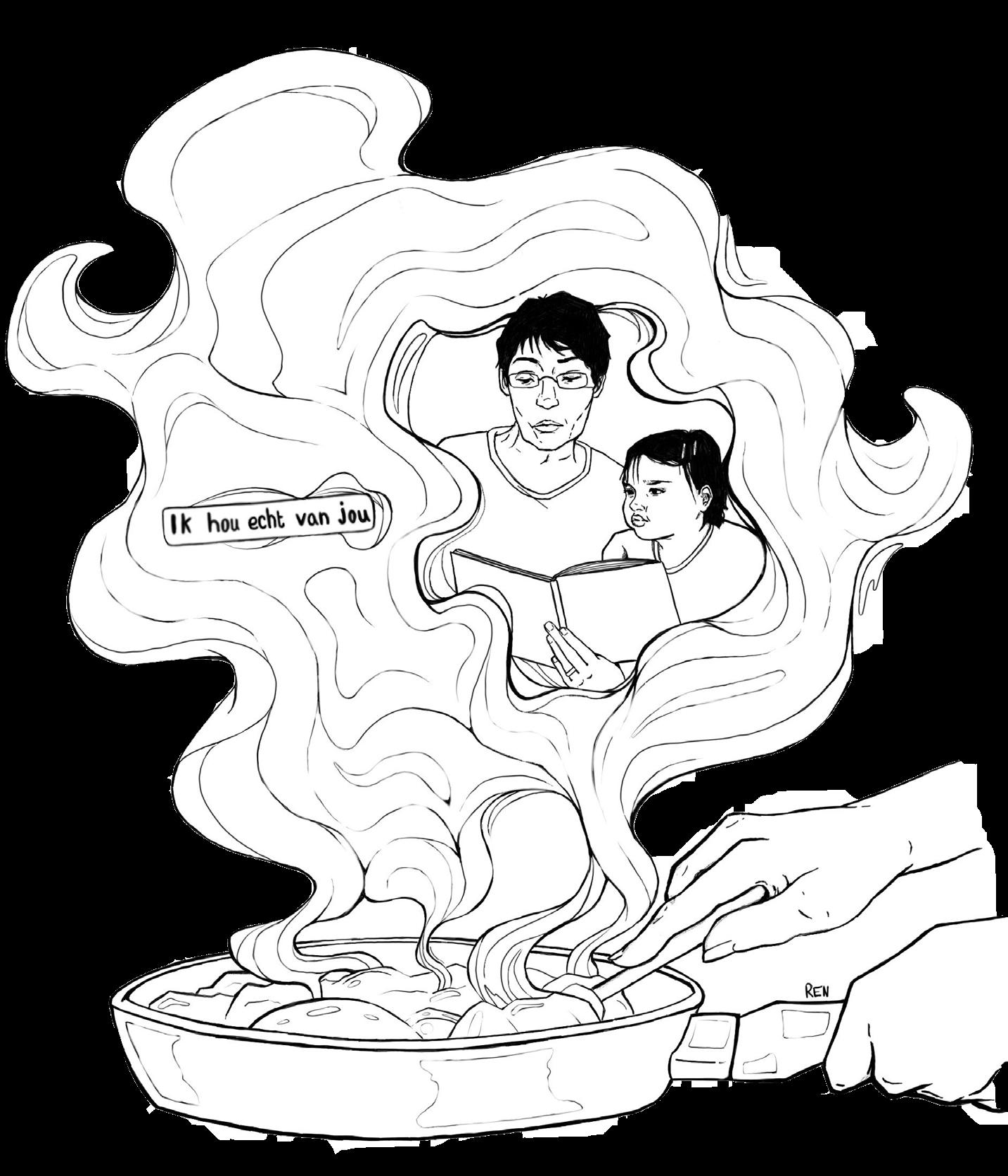
The microwave buzzes as I defrost a frozen waffle. Simultaneously, steam dances up over the stove. Chopped apples are simmering in a pan as I wait for them to soften. I woke up today with a craving, and I'm replicating a breakfast to remind me of home. I know how the apples are supposed to be - I shouldn’t have to put any pressure on my fork as it cuts through the fruit that once was hard. Following my taste buds home, I add a dash of cinnamon.
I woke up thinking of you. I craved your stoofpeertjes. It's mid July, and yet my mind has ran ahead to fall. Oma’s appletaart - the familiarity of a culture and its flavors. I don’t think I'm homesick, but I long for familiarity that's grown foreign.
My apples are softening, but I can’t yet sink my fork as softly as in your stoofpeertjes. My mind wanders. Once, you too were so hard, so difficult to cut through. It is one of the biggest struggles my mom expresses from her childhood. You didn’t talk, you cleaned. You demanded a level of perfection that was difficult for a child to replicate. There is practicality in your lack of emotions. You quit school at 14 to work for a family that wasn’t your own, cleaning a house that you would never live in. You continued to work until you were 80 years old. Why waste time on affection, when there's so much to do?
I know you can be perceived as cold. I don’t remember that, but I have heard stories. I know you complimented a dress I wore at 5 years old with the phrase ‘she can’t get any fatter, or else it won’t look nice’. I know you blamed my mother when she was assaulted. I know your reaction to my mom’s pregnancy was ‘I bought a new fridge’. I know you redid the laundry if your children folded the towels the wrong way.
Yet you softened.
At 14, I realized you never told me you loved me. I started saying it to you, because I felt it.
Purposefully and with intention, before I left the room I would look into your eyes.
‘I love you’
‘Okay’. You would reply. Or, ‘That’s good’. A quick hug, and I was off. But over time, you softened. The cinnamon soaked into your pores as the words of affirmation swirled like steam around your skin. Now, you say it back. ‘I am proud of you’, ‘I love you’, roll off the tongue, dense with condensation. My taste buds follow you home as I nestle in our conversations. I call you once a week. It isn’t enough.
Family sticks by each other, and I'm grateful for our family bond. I wish more people cherished this.
This softness worries me. I've grown to love you so deeply. I've grown to care for the hard shell and embrace the sweet dough of your growth. You stick to my heart and I sprinkle sugar on your head. I lay awake at night, fearing that I'll lose you sooner than expected.
If we weren't family, I know I might not have stuck around. I worry about friends of mine who say that they never speak to their grandparents or other family members because they don't like them, or they don't get along. I look back at our relationship and wonder how we

I'd done the same.
Yet I understand that leaving is a privilege. If somebody's cold, distant and spews hateful words, sticking around because ‘they're family’ is a dagger to the core. Nevertheless, this blood we share, whether we like it or not, has taught us both to stay. It's the heat that softens. Where I once saw chilling cold, I now see nothing but warmth. Family sticks by each other, and I'm grateful for our family bond. I wish more people cherished this.
I can't forget that I was privileged too, to be able to love you from a distance. I know my mother wasn’t afforded this liberty. I trusted I had arms to fall into when your response to my affection was solemn. She did not have the same. I had an ‘ik hou van jou’ waiting for me at home.
If it weren't for our shared blood and the distance between us, I'd blame you for the unfair way you treated my mother. I know your mother put sticky notes on her furniture with the names of her family on them. I know if you did something wrong she would remove your sticky note without a word. No inheritance for the unlikeable family members.
If it weren't for our shared blood and the distance between us, I'd blame you for the role you played in my eating disorder. The way you talk about my cousin’s bodies in their absence is enough to make my back bend under weighted expectations. I see you dieting at 80, swearing that this year you will loose weight, laughing at how ‘terrible’ you are being for taking a cookie with your tea.
If it weren't for our shared blood and the distance between us, I'd blame you for your coldness. I see you trying, and I hug you firmly. The response of this hug gives me hope that people can change. I see your growth, even at 80. I hope to grow alongside you.
I hear in your voice how you guard against the love others want to give you. You do not want to be helped, and you do not need anything. I whisper to
A Brief and Personal History of Chinese Food on Christmas
by Katrina Joy FunkThere are some traditions so essential to a family or community that one doesn’t even question where they came from. Though they may leave outsider's scratching their heads in confusion, these traditions help to make us who we are. It seems that most families, aside from the usual holiday traditions, have something special, something a bit unusual that is unique to their family.
Growing up in the United States, it was common for my family to order (Americanized) Chinese takeout on Christmas Eve or sometimes even Christmas Day. After deliberating over the options, my family would write down their choices on a Post-It note and I would be charged with calling in the order. Then, my dad and I would make the drive to pick up the food, heat turned on full blast, snow swirling in front of the headlights. Once at home, we’d dish up steaming plates of pineapple chicken, fried rice, and chow mein, mix up a few gin and tonics, and settle down around the candle-lit dining table.
The history of Chinese food on Christmas is much more complicated and nuanced than just the tasty appeal of a celebratory takeout meal. It begins in late 19th century New York City, where Jewish and Chinese immigrants lived side by side in the city’s Lower East Side. As Jewish immigrants sought assimilation, they often felt left out of customs such as Sunday lunch after church and Christian holidays such as Christmas. The question of “what do we do on Christmas?” has been asked by Jews for as long as the holiday has existed. There’s the question of whether or not to put up a Christmas tree and decorate the house. Should presents be given out? Is a special meal to be eaten?
I knew other families who did the same, and never thought much about the custom’s origins. It just seemed like another way to celebrate the holidays and avoid the added hassle of cooking a big Christmas meal. Though my family has always celebrated Christmas, I consider myself to be ethnically Jewish, my dad’s side of the family having Sephardic Jewish origins. However, since I was not raised religiously Jewish, my pride in my heritage has expressed itself in more subtle ways. But to me, Chinese food on Christmas was simply something to look forward to, and in no way a link to my Jewish heritage. That is until, ironically enough, I delved into researching the tradition’s history for this article.
By the 1930s, New York’s Jewish population seemingly found an answer to the last question when they began to frequent Chinese restaurants on the holiday, allowing them to celebrate Christmas in their own way. However, the choice of Chinese cuisine was not necessarily random. According to the Jewish religion, it is forbidden to mix milk and meat. Traditionally, Chinese food is almost always dairy-free, making it an ideal choice for Jews keeping kosher. However, many American-Chinese dishes commonly contain pork, which Jews are forbidden to eat.
In an interview with Vox, Joshua Eli Plaut, rabbi of Metropolitan Synagogue in New York, references sociologist Gaye Tuchman’s explanation of why Jews considered pork in Chinese dishes “safe.” Tuchman chalks this “plausible deniability of non-Kosher foods” up to the fact that the pork was often hidden among other ingredients in the dishes, therefore making it “easier” to eat. This made it safe treyf (treyf being the Yiddish word for ‘non-kosher’).
In a way, this tradition is a triumphant, yet somewhat melancholic embodiment of the Jewish immigrant experience in the United States. Considered outsiders for generations, and having faced a spectrum of
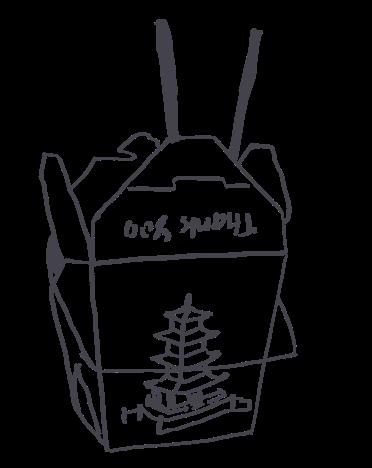
hostilities, Jewish-Americans carved out a vibrant existence for themselves in a foreign land. This makes me think of my Jewish grandmother, who emigrated from Turkey and found herself living in rural America in the 1950s. I think of the parts of her life and of her past that she hid away, afraid of being seen as “un-American.” I think of the once gleaming menorahs, that were packed away in boxes, upon which dust would quickly collect. I think of how she refused to teach my dad or uncle any of the many languages she spoke fluently.
Thinking of the compromises and adjustments she had to make is heartbreaking. However, I also feel pride. Pride in her ability to adapt and find moments of happiness in the unfamiliar. This Christmas, when I return home, and my family sits down to our Christmas Eve meal from our favorite local Chinese restaurant, the tradition will have taken on a new meaning. I’ll think about my grandmother and the generations of Jewish families, having to adapt and bend, but creating something new, sweetly and uniquely theirs along the way.
But to me, Chinese food on Christmas was simply something to look forward to, and in no way a link to my Jewish heritage. That is until, ironically enough, I delved into researching the tradition’s history for this article.
Considered outsiders for generations, and having faced a spectrum of hostilities, Jewish-Americans carved out a vibrant existence for themselves in a foreign land.
Feeling Under the Weather?
by Violeta BagazgoitiaAs we enter the darker months of the year, a cloud of sadness hovers over our heads. Doom and gloom are creeping into the cracks of our summer memories, which seem farther away with each day. With this in mind, we need to get ready to face the hormonal imbalance (referred to as seasonal depression) that comes to many as the seasons change.
It might come as a surprise to some, but this concept goes further than girl in red’s song; seasonal depression or “seasonal affective disorder” is a mood disorder, and therefore a type of depression. This chemical change in the brain is triggered by the shortening of days and leads to several depressive symptoms.

To many, it might seem absurd to think that the weather has such power over our emotions, and for this reason, there is undeniable scepticism towards those who suffer from SAD (as ironic as the term may sound). However, depression is completely different from feeling sad or unhappy. It is not a condition that can be willed away, this is why it's important to shine a light on winter depression.
In order to create an image of what this disorder entails, I will pose a series of questions; do you sleep a lot, feel drowsy and irri-
Dearest Campus
table? Have you lost interest in things you used to enjoy? Do you have headaches and more appetite? These are just a few of the symptoms that come with SAD, along with anxiety and low sex drive.
However (and this is a big however), this does not mean that if you`re not in the mood to give a blowjob to your boyfriend or if you`ve gained some weight after returning from Christmas at home, you have seasonal depression. Some may relate to a few of
the symptoms and confuse them for the disorder. In other words, hypochondriacs. Feeling “under the weather” right now is perfectly normal, the days are shorter, the sun barely comes out and the temperatures are decreasing as we approach the end of the semester. Having a slow day and just wanting to stay in your room with a cup of warm tea and a movie is completely justified, however this does not mean you have seasonal affective disorder.
Whether you actually have this disorder or not, feeling blue during this season is perfectly normal, but not something you should ignore. Treat each day as it comes and don’t let the sad ones get the best of you. Remember that others are also going through the same thing as you, so don’t be scared to ask for help if you need it. And if you don’t feel like directly asking for help, you can always just ask for a hug. Take some slow days for yourself every once in a while.
Winter, along with all its dark clouds and heavy raincoats also brings colourful Christmas lights, hot chocolate (with or without whipped cream on top), warm hugs from grandparents and a lot of family dinners. So, in light of all that is to come, don’t forget to take care of your mental health.
As campus prepares to welcome the dread of the festive season with international students scrambling to make plans for the new year and coming to terms with being alone during the holidays, I hope this edition brings you much needed companionship with articles on Diederix and his life story, the history of Chinese food on Christmas, fatphobia, daddy issues alongside a spread on neurodivergence.
This is Kitty, our PR manager’s last edition with us. I bid her goodbye with sadness in my heart and wish her all the luck. I hope she knows she lights up every room she enters.
I want to thank the lovely Clara for such a wonderful cover page. She is endlessly kind and always lets me borrow her bike. Pablo, Ida, Katrina, Hilde, Sophie, and Isa, thank you so much for all the work you put into every edition.
To the graduating class, congratulations! You’ve made it and no longer must smell the wafts of pig manure in the air or the pure joy of getting gently refrigerated chips or tampons. I wish you all the very best in what’s to come.
As I get out of class in complete darkness and spend time by my radiator drinking soup, I leave this edition with you. Perhaps it will reach you in the midst of packing up things from the three glorious years you’ve spent here, or as you prepare to go on exchange, or as your childhood trauma comes to greet you at the dinner table with your family, or maybe just as you pick up fresh oliebol.
If you're alone this New Year’s Eve, sit by yourself in front of your UCU table (make sure no damage comes to it, wouldn’t be fun to pay 100 euros for it) with perhaps a candle and a 15 euro pizza. Don your best clothes and listen to yourself. Cry if you need to. I know I will.
With love,
Avantika Bhowmik Chair & Layout DirectorA Love Letter to Berlin
 by Júlia Pejó Vergara
by Júlia Pejó Vergara
The first time you visit Berlin you’ll either inevitably fall in love with it or find it the most horrific, cold metropolis on the planet. There's no such thing as a middle ground for the capital of Germany, a vibrant parallel universe that seems to spin around itself (and of course, your choice will be largely influ enced by the season of your visit!).
The first time I visited Berlin I was around 13. The trip was part of a “bonding” family vacation, and I remember the air was freezing (or maybe it was just a family from Barce lona suffering from not-made-for-northernweather-syndrome). Of course, we fulfilled my mom’s stereotypical tourist dream: The Brandenburger Tor, The Pergamon Museum, the Fernseher Turm... and the truth is, I fell in love with this place.
Captivated by the impromptu graffitied walls of Kreuzberg, the number of teenytiny wholesome cafes and the never-sleeping nature of the city, I found myself projecting my own future in Berlin. I remember the last night we spent there: we were having dinner at a café; I looked my mom in the eyes and I said: ‘One day I will live here’.
Well, turns out now almost ten years have passed and I am living in Berlin, and to be honest, this blind love needs some nuancing. Berlin is an intense city, vibrant, overwhelming at times, and requires time and effort to learn how to navigate. Berlin, I’d argue, highlights the best and the worst of humankind. It's home to millions of people who come from everywhere, it’s the materialisation of unfolding history, the most latent reminiscent of the DDR.
Berlin shakes you and kisses you in the ass. Berlin welcomes you with open arms, but somehow still feels cold. Berlin is a club where everyone is half naked (or completely,
no judgement) and you are offered every possible drug at the toilet. But Berlin is also this cute old Oma drinking coffee and selling handmade yarn socks at the Sunday weekly at Boxhagener Platz.
Berlin is cute but can also be dark. The current housing crisis has turned the city into a wild free-market jungle in which you have to fight for your own survival. Finding a WG (short Wohngemeinschaft, or shared flat) is allegedly one of the proudest achievements of my life. And yet I find beauty in my overpriced WG in Danziger Strasse with a broken sink and my mattress laying on the floor. Berlin has taught me to be grateful - for my humble home, the (sometimes too shy) sun, and for the freedom it offers you. Berlin is a place of liberties - no one will look at you for the way you dress, for whom you kiss or your life choices. I feel safe here. I feel free.
It feels like Berlin is in itself an adventure. You leave your home every morning and you never know what’s gonna happen. Might be an (actually very expected) unexpected delay on the Ubahn (the metro). Or perhaps a naked dramatic music performance on the tram. Maybe, you’ll bump into a mass techno parade (true story) or a demonstration for the rights of chihuahuas. Maybe, if you’re lucky, you’ll witness an illicit drug police raid and perhaps, by the end of the night you will end up at an underground Brazilian drag queen bar.
Ultimately, Berlin is packed with experiences, fascinating people and mind-blowing spots to discover. I would like to end by mentioning some of my favourite ones. Because I can. First of all, Spätis are mini grocery stores (they sell mainly drinks)
that are open 24h. Do you have a craving for banana juice (yes, it’s a thing here) at 4am? You go to your Späti. You forgot to buy some mate for the rave tonight? You've got your Späti. Späti is that friend that always got your back and it never expects anything in return. And maaaann, alcohol is cheap here!
Secondly, another of my favourite things (maybe this has to do with my major?) is how much art there is everywhere and how accessible it is! As a student, I can afford to consume performances and exhibitions every week without having to sell any organs. Art is democratised, made by and for the people, and I absolutely love it.
Finally, and this is going to be controversial, but I must confess my inexplicable love for the German language. I know it's irrational, but there's something about the unapologetically long words and the devastating Adjektivdeklination that makes me thrive. Practising my broken German (particularly with middle-aged German women in the S-Bahn) has been a source of joy and sorrow. But really, don't believe in stereotypes. Germans are really nice (sometimes). Or maybe it's just Berliners.
Berlin, I’d argue, highlights the best and the worst of humankind.
Sadly, my days in the city have come to an end. I've cried in Berlin, I've loved it here. I've felt nostalgia for a place that I don't even dare call home. There's an eternal sense of belonging emerging through the streets of Berlin, in fact I have managed to somehow find myself here more than anywhere else.
A few days ago, I saw a huge Ubahn stop coming back from my friend’s place. It said: ‘Having to leave Berlin feels like leaving the love of my life’. Perhaps, and only perhaps, this is the only way to describe how I feel about my upcoming goodbye. Thankfully, I can look at myself in the mirror, into the depth of my pupils and promise (this time to myself): I'll be back. And I will.

Movie Monster
Christmas Classics
by Alejandra Monerri RevueltaHohoho! My present for you this Christmas is one show and two movies to binge these festive days. Movies that I dare say have become Kerst classics because of how many times I’ve watched them (sometimes even when it wasn’t the holly, jolly season).
I’ll share with you my strategy: as a uni student with a pretty empty bank account, I will not be buying myself an advent calendar. Who wants the carbs anyway? But, because advent calendars are fun, I will be watching an episode of Dash and Lily a day. Yes, my first recommendation to you is Dash and Lily, a love story set in Christmassy New York. It doesn’t get any more festive than that. The series follows Lily, an optimist who adores Christmas, and Dash, a cynic who hates it, as they try to convince each other of their views on the holiday season.
My next recommendation is Love Actually. This famous rom-com follows the love
stories of a number of characters in London, all of which tie together on Christmas Eve. A prime minister who is in love with one of his staff, a widow whose son is in love with a classmate, a writer who falls for his Portuguese house-keeper, a guy in love with his newly wedded best friend’s wife, two body doubles in a sex scene, and a mother who finds out her husband is cheating on her. Plus a once-successful musician promoting his newest, terrible hit ‘Christmas is all around’.
Last but not least, I’d like to mention The Holiday. Two women, an American, Amanda, and a Brit, Iris, are both disappointed in the men they love, and switch houses for the Christmas season. And, even though it doesn’t happen so easily to the rest of us in real life, they find new love stories. Amanda meets Iris’ brother, who she thought to be a one night stand, whilst Iris falls for Amanda’s co-worker. What is most interesting about The Holiday is how,
Settling it over a cup of tea
by Pieter DolmansGenerally, I think that the opinions we come across can be divided into two categories: common opinions, which are held by almost everyone (think ‘murder is bad’ or ‘garlic bread is good’), and controversial opinions, which are also held by many people but are often contested too (think ‘eating animal products is unethical’ or the famous pineapple-on-pizza-conundrum). We can, however, think of a third category. This is a category we can’t include in the other two, as they’re not really opinions that we often come across: weird opinions. These are not popular enough to be common, and not discussed enough to be controversial. They’re pretty much unknown.
A few weeks ago, a friend asked me: “What’s the weirdest hill you’re willing to die on?” I couldn’t think of anything, so I asked her what her answer would be.

“Cannibalism and necrophilia are completely morally acceptable.”
At first, I burst out laughing, then I brushed it off and went on with my day: a common reaction to the ‘weird opinion’. It’s too far removed from the general opinion to accept, but not held frequently enough to pose a real threat to our way of thinking.

A few weeks later I realised that I have plenty of weird opinions myself. One that kept coming back to me was that all marketing, except for plain-text information about a product, should be prohibited. I’ll save my argument for another column, but the more I thought about it, the more important this opinion became to me. When I analysed and unravelled it, it turned out to be an integral part of my political worldview. And yet I had never taken the time to share it with anyone, let alone advocate it. Why? My only explanation was that it was ‘weird’. Because it was so unusual, there had never been a context in which it could’ve been brought up. Besides, I knew from personal experience how people deal with others’ unusual views.
despite their differences, Amanda and Iris prove more similar than they thought, and become unexpected friends.
Let’s be honest, Christmas rom-coms aren’t known for their outstanding cinematic quality. But these movies aren’t the rule; they’re the exception. These recommendations aren’t clichéd ‘woman working for enterprise™ in big city, forced to visit picturesque, small hometown for Christmas, falls in love with childhood crush, end scene,’ productions. They are more than just romance, they’re about friendship, and the magic of Christmas, but in a less cheesy, typical way. They’re about stepping out of your comfort zone and discovering new things in life, which you were too scared to do before.
My present to you this Christmas is the inspiration these movies communicate, and hopefully they push out of your comfort zone to experience the magic and start off 2023 with a big smile!
I can only conclude that uncommon opinions are often only uncommon because they are difficult to maintain. It’s easy to laugh at them, and even easier to ignore them. And through that automatic mockery and dismissal, they are driven out of public discourse.
So, the next time you come up with a weird opinion, don’t wait until it comes up naturally in the conversation. Get your arguments together, announce it to the streets, and don’t stop until you’ve convinced someone, or someone’s convinced you. And the next time you hear someone share their weird opinion, I implore you: don’t laugh, don’t scoff, and certainly don’t ignore. Even if it’s about cannibalism. Ask them for their reasoning, work the idea out, and then decide whether you agree with them or not. You’re going to end up with a lot of weird opinions, but you’ll be certain that you formed them rationally.
Katrina's Playlist
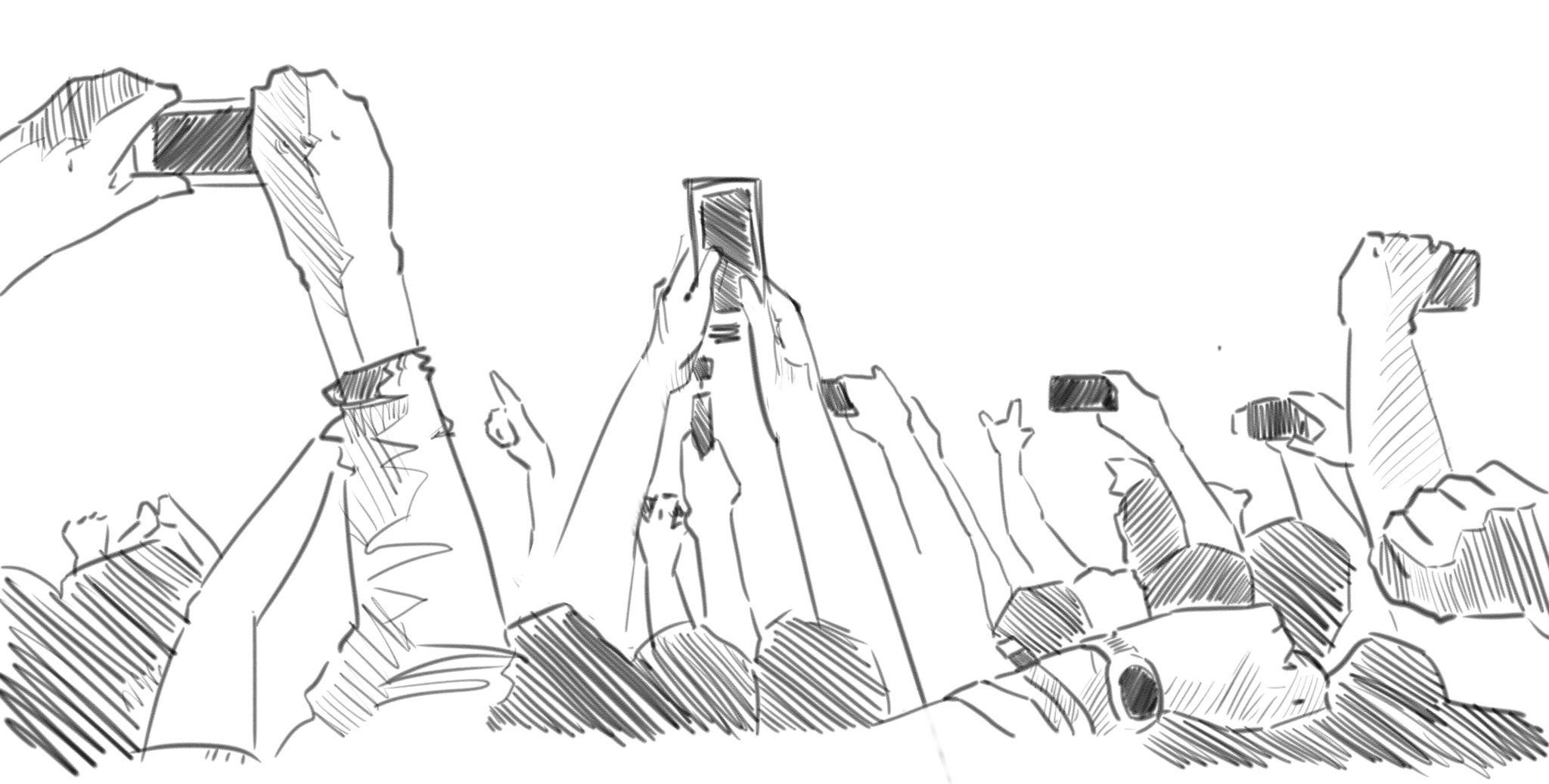 by Katrina Joy Funk
by Katrina Joy Funk

There’s really nothing like getting off campus to clear your head, refresh your soul, and remind yourself that there are other people in this world besides your fellow campus dwellers. Even better if the trip off campus involves heading into Amsterdam for a concert. And even more exciting if that trip involves taking that fun little ferry ride from Amsterdam Centraal across the water to Paradiso Noord. Well, at least that’s what my Wednesday night looked like. Since moving to the Netherlands, Tolhuistuin (formerly known as Paradiso Noord, an offshoot of the famed Paradiso venue) has been one of my favorite hidden gem discoveries. Though smaller and more unassuming than its cavernous, stain-glassed sibling, it provides the opportunity to get a bit more up close and personal with the performers.
It was already getting dark at five-thirty when we began our trek into Amsterdam, armed with snacks from the Utrecht Centraal’s Albert Heijn and canned gin and tonics. I get excited about attending nearly any kind of concert, but this was one I had been especially looking forward to. Paradiso Noord is known for hosting folk and Americana artists, something which I adore because it feels like a little slice of home in the middle of bustling Amsterdam. This particular night, an all-time favorite of mine, Shakey Graves, was playing. I had impulse-bought tickets back in July after missing out on his performance at a festival in my hometown. So, of course, I was thrilled to discover his European tour took him through the Netherlands. For those unfamiliar, Shakey’s music is a captivating combination of rock, blues,
country, and indie. A good introduction would be “Roll the Bones” from his 2013 Audiotree live session. You’ll be hooked.
We arrived at Tolhuistuin and joined the long line snaking out the door of the building. Once inside, we secured a place close to the stage and indulged in a little people-watching to pass the time. Concertgoers of all ages laughed and chatted with each other as they sipped beer from tall plastic cups. The atmosphere was warm and relaxed though the growing excitement was palpable. Eventually, the opening act made her entrance, the up-and-coming folk artist S.G. Goodman. Dressed in a Carhartt jacket, wavy bangs just skimming the tops of her John Lennon-style classes, she charmed the crowd with her sense of humor and thick Kentucky accent. “I had to sign a piece of paper that said I would only play sad, slow songs so when Shakey shows up you guys’ll be ready for the ‘rock show.’ Luckily, I’m pretty good at playing sad, slow songs,” she quipped before launching into her set of sweetly melancholy love ballads. All too soon, S.G. Goodman took her final bow, waved goodbye to the audience and it was time for Shakey Graves.
Now, the crowd was electrified. Shakey Graves soon appeared and took the stage with a “what’s up Amsterdam?!” Accompanied only by his electric guitar, dressed in a tan suit - a divergence from his usual uniform of a cowboy hat and white undershirt - he began to play. As the first song began, Tolhuistuin was transformed into a bar in downtown Austin, Texas. You could almost feel the weight of the humidity and hear the click of cowboy boots on the floor. Soon, Shakey (whose real name is
Alejandro Rose Garcia) invited his band on stage, all dressed in matching tan suits, and the ‘rock show’ S.G. Goodman had predicted, began. Launching into “The Perfect Parts” off of his 2014 album And The War Came, Shakey soon had the crowd dancing and singing along. The only thing that disrupted the vibe was the group of rowdy, drunken friends who would not stop singing the wrong lyrics, despite increasingly angry pleas from fellow audience members and eventually even from Shakey Graves himself.
The evening was winding down and the moment everyone had been awaiting was nearing. Singing the last notes of “Nobody’s Fool,” Shakey bantered with the audience: “you’re somebody’s fool for sure, for fucking sure. What’s life without being somebody's fool half the time, at least? That’s the good stuff!” Then, much to the audience’s delight, he began to play the first notes of “Roll the Bones,” accompanying himself with a kick drum, riffing and improvising on the familiar favorite. The crowd was transfixed.
It was all over too soon. Shakey and the band said their goodbyes, and the slightly dazed audience spilled out into the chilly November night. Back on the ferry and in the station, I saw several familiar faces from the concert, all looking happy and tired, still humming the melodies of the evening. I returned to Utrecht that night feeling creatively inspired and as though I’d been transported to a different place and time. As I settled in for the night, the music still echoed in my ears. It really is nice to get off campus sometimes.
Busy? We're Burnin' Out, Baby
by Perlei ToorI write this piece in half hour intervals, spread between days. I write this piece in the time I’ve got. I write because it feels more like rest than scrolling on my phone or watching Netflix. I write it to fill the moments.
To call them more than moments is deceiving. They are simply moments, not worthy of the label of time. It is the start of November, and I am looking through a calendar of haze to the shining light that is the second week of December. I peer through a forest of meetings, shows and obligations. The second week of December will be the first week I have no major events or deadlines. The week after is finals.
My situation isn’t unique, and I am not writing for sympathy. But, as I have embraced a sobbing friend for the third time this week, their body tense with the stress of obligations, I find myself wondering if this is normal. Should 20 year olds be skipping classes to work on group projects or committee obligations? Should we be leaving parties early to work on essays?
We have all flirted with the busyness of UCU. Some of us have done more than flirting. Inevitably, we have waltzed into the allure of echoing one liners.
our character. The exhaustion is worn with beauty.
It started as a casual fling. Maybe you joined a committee and enjoyed having something next to your social life and academics. Maybe you needed a job, or you were offered an internship. Maybe all of the above. With busyness on your arm, you walk like royalty through a campus where work is currency. Doing a thousand things and more qualifies you as doing UCU ‘right’.
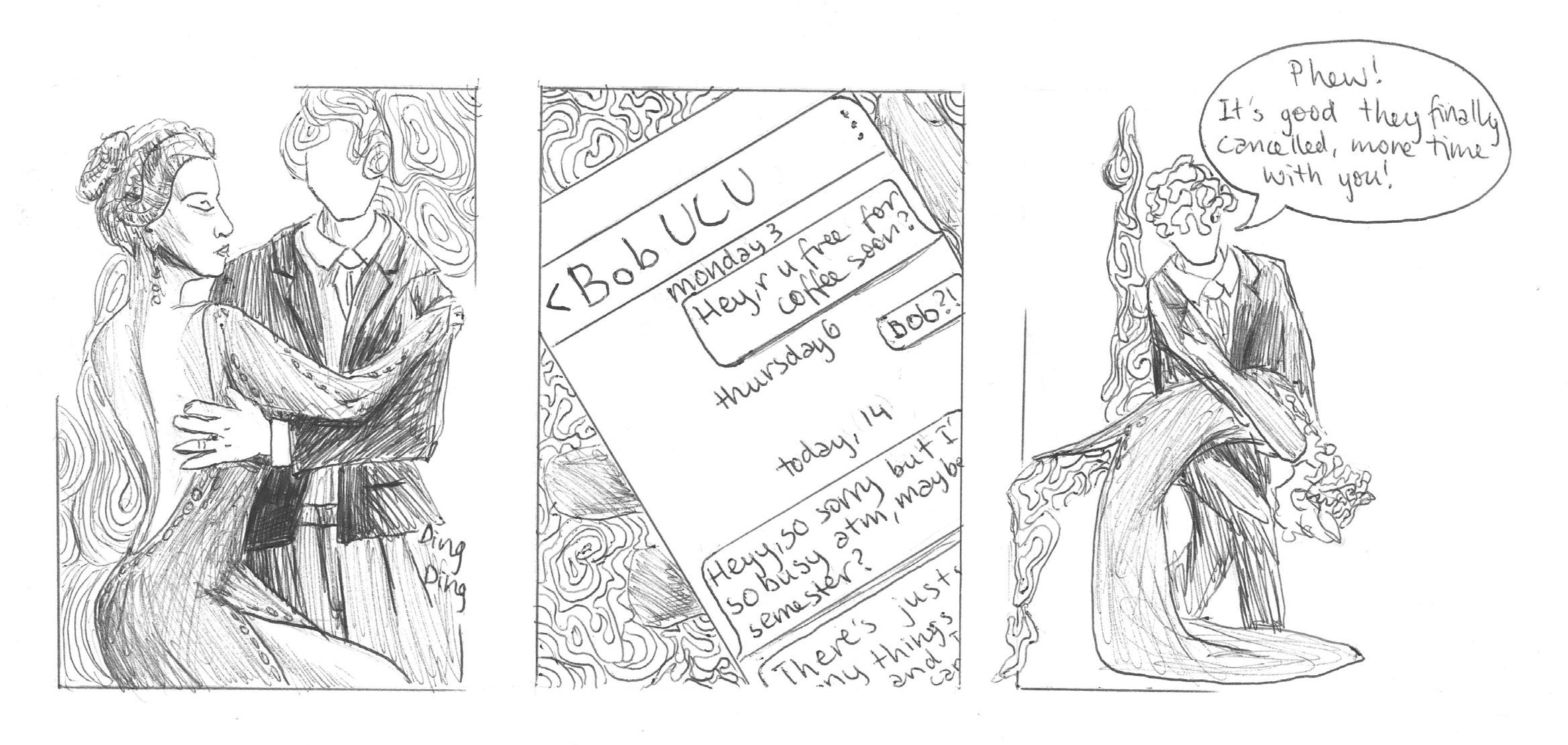
You flaunt your new affair at parties with casual remarks. The bags under your eyes are love marks, hinting at lost sleep. You seductively make jokes about the lack of sleep. “This one keeps me up all night”, you joke. You and busyness look good together. You carry a brand new planner when you’re apart. “Oh this thing? I just need it with everything I’m doing at the moment. It was a gift, isn’t it cute?”
Should we be leaving parties early to work on essays?
Soon, you start to cancel lunch dates to run to committee meetings. Academics become the least of your priorities and you dive further. You commit to more, and you lose yourself in the routine of this new relationship. There is comfort in the busyness. You have less time to think of what’s next, when a strict Google calendar dictates your life. Workout-to-meeting-to-class-to-meeting-to-class-to-group-project-to-dance-torun-to-dinner-to-work-to-meeting-to-sleep. Thinking is for the lazy, for the unengaged.
canceled. More time to work’. You have set a standard of glowing expectation, and the love you flaunted is a performance people have now come from all over to see. “You’re always so busy, aren’t you?”. You nod, and you dance harder than you ever have before, smiling wider.
You panic when the deadlines come flooding. Busyness is only beautiful when it is managed. There is so much more at stake when you see the swinging balance of your position in UCU’s carefully constructed order. Your friends express their concern over your schedule. You take their worries as a compliment.
We all do so much. We burn so hard. Our backs break under the persistence of pressure. We fizzle and pop and crack. We grab desperately at the spark. Everybody else seems to be managing, why not us? We close the door and crash. The sobs echo as that voice whispers, ‘a mental breakdown, good. Now you have evidence of how busy you are’.
So we drag ourselves to classes and meetings. And in those classes, we ask one another how we’re doing. And if the answer isn’t ‘I’m busy’, or ‘I’m stressed’, a layer of silent judgment sets in. You’re not having breakdowns? You’re not running from place to place? Are you doing okay?
We are bright, beautiful, and brilliantly busy. We are so young. We dance on the flames, furious at the race of time, our feet moving so quick that we do not feel the burning of the flesh. We flourish in the waves of it all. We see the inevitable on the horizon.
“I’ve got to run, I have a meeting”, “this week is just so busy”, “I’m just a little stressed”. We speak with a smile. The sweet dew of being busy tastes good as it rolls off the tongue. The allure of busyness appeals to
The fractures are few but increasingly frequent. Sometimes you sleep so little that the brain feels foggy. You can’t remember if this is your 4th or 5th coffee of the day. A friend cancels dinner and your thoughts overwhelm you. You notice you release a heavy breath. ’It’s good they
Beautiful and busy, we all know we are set to burn out. Panicked, we braid the already burning wick long enough, hoping we’ve timed it right. Hoping we burn out right after graduation.
We all do so much. We burn so hard. Our backs break under the persistence of pressure. We fizzle and pop and crack.
GastronomyCo Monthly Recipe
Coca-Cola Christmas
by Isabella Rodriguez Paoli, Chair of GastronomyCoCoca-Cola runs in my family. And now, it runs my life. My parents met while they were working for CocaCola in Peru. Because of this, my house is filled up with Coca-Cola paraphernalia.
Instructions
My Coca-Cola bottle opener enables my social life, my Coca-Cola gym bag aids my physical health, and my Coca-Cola ornaments bring Christmas spirit into my house.
1. In a pan, melt the butter. Break the angel hair pasta into small pieces (sorry Italians) and brown it with butter. Stir regularly so it doesn’t burn!
2. When it's brown, turn off the pan.
3. In a pot (even better if you have a rice cooker) add the oil and minced garlic. Wait for the garlic the brown.
4. Add the 2 cups of WASHED rice to the pot.
5. Add 1 ½ cups of Coca-Cola and 1 cup of water to the pot.
6. Stir and add salt to taste (I add around 1 teaspoon).
7. Cook rice normally. Once the rice is done, remove the lid and add the raisins, browned angel hair pasta (it should be crunchy by now) and the nuts (chopped).
8. Put the lid back on and wait 15 minutes.
9. Remove the lid, you will see that the pasta as well as the raisins are now soft.
10. Mix all of the ingredients and enjoy!
However, most importantly, it is present in my favourite Christmas dish: Coca-Cola rice. Coca-Cola rice isn’t called Coca-Cola rice in Peru; we call it Arabic rice. Why? I don’t know. Is it problematic? Probably. Henceforth, I will be referring to it as Coca-Cola rice.
Ingredients
3tbs of oil
3 cloves of garlic
2 cups of rice
1/2 cup yellow raisins
1/2 cup of black raisins
2/3 cup nut mix (pecans and walnuts)
50g of butter
30g angel hair pasta
1 ½ cups of Coca-Cola!

Agony Aunt
Dear Agony Aunt,
My tutor suggested I should work less to focus on academics, but if I do, I can’t afford to go to UCU anymore. Is it possible to be financially, mentally, and academically stable at UCU?
Dear reader,
Unfortunately, there’s no quick-fix to this edition’s query. Life at UCU is difficult for any student, with highly demanding workloads and an academic culture that seems to prioritize grades and productivity at all costs. On top of that, there is intense pressure to partake in everything, go to every party, participate in every committee event, or, if you need something to pad your CV with, take on responsibilities by joining one of our many student boards.
For those of us that aren’t financially well-off, additional challenges come into play. While at many Dutch universities, having a parttime job is the status quo, you’re somewhat of an anomaly at UCU if you work alongside your academics. The amount of times I’ve been asked just why I would choose to work if I don’t love my job is astonishing. And whenever I get overwhelmed with the number of tasks on my to-do list, work is the first to be suggested as ‘optional’.
I understand some of the rationales, studying at UCU is a full-time job in itself, your main job, if you will. If your part-time responsibilities are hindering your academics, it makes sense to cut down on them. If you then can’t make ends meet, you borrow money from the government. But life isn’t as clear-cut as it seems, and borrowing extra money is not an option for many students struggling financially. No matter how much we might want to take time off, not being able to afford tuition, campus fees, or food is not going to help our situation.
If your grades are suffering as a result of your financial insecurity, it can feel isolating to live on a campus surrounded by people who often have a high level of financial privilege. Especially if your tutor doesn’t seem to understand your situation, it can start to feel like there’s no way out. UCU is, and probably always will be, a highly demanding institution, that presumes a certain level of privilege in its prioritization of academic success. A majority of UCU students will probably always have parents that have the money to support them throughout their studies. And those of us struggling financially will probably not win the lottery anytime soon.
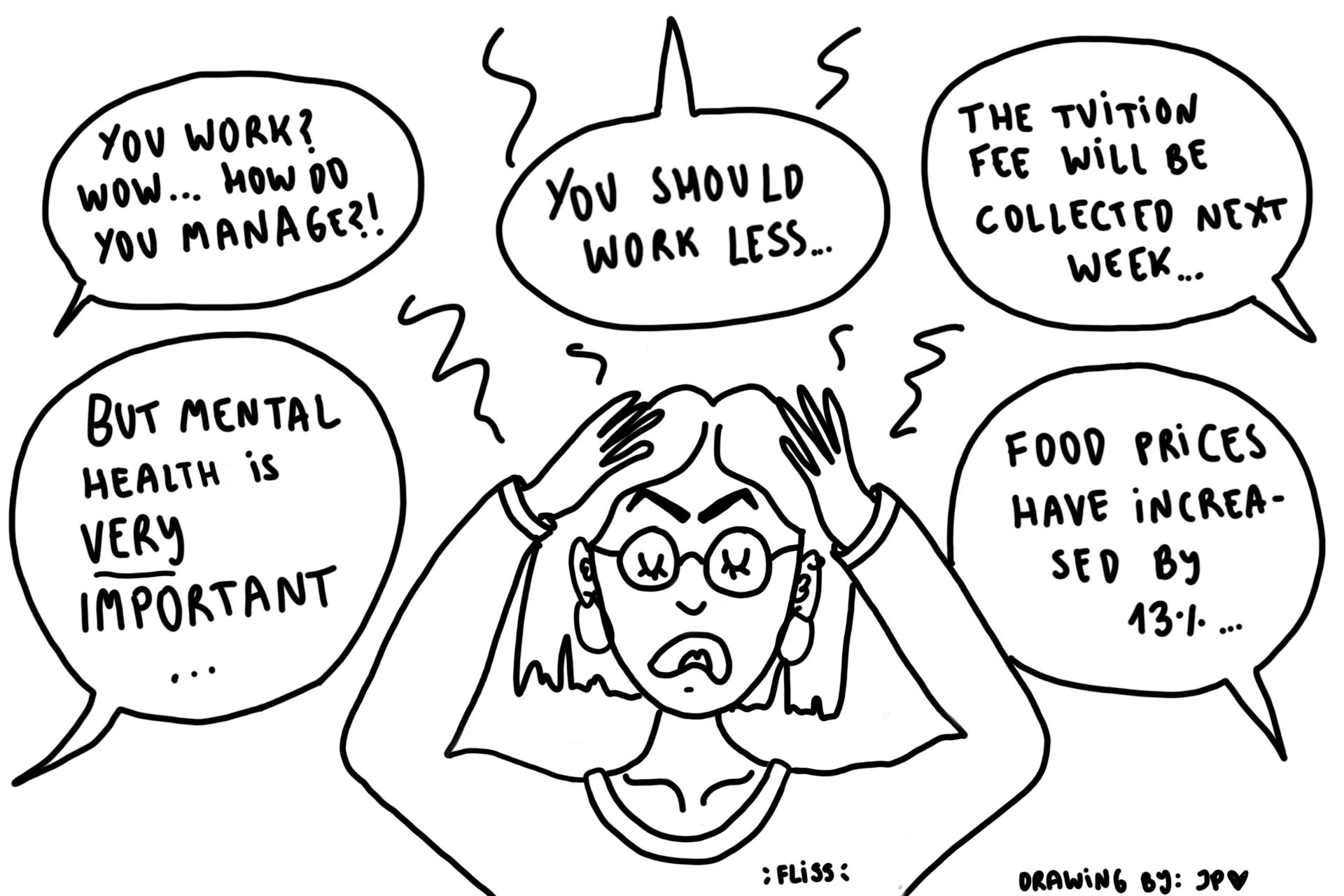
So what can you do? The one thing that helps me most in balancing my life at UCU with my part-time job, is looking for the right type of job. If the job has a lot of downtime, you might be able to do some schoolwork during your shifts, think librarian, receptionist, or babysitter. At the same time, jobs that require more skills will pay you a higher wage. Examples are tutoring jobs, office work, and administration. If you’re able to work nearby, that will save you travel time, meaning you spend less unpaid time busy with work. You could also choose to work during the breaks only, many tutoring institutes offer intensive exam-prep courses for high-school students during holidays, meaning you don’t have to juggle both work and academics at the same time.
Lastly, if your job is physically or mentally taxing, you might be too tired to study after your shifts, so think about what times you want to work, and what times you want to study. If you study better at night, try to see if you can work in the mornings you’re free. If you cannot quit work entirely, try to find a way of earning money that works better for you, so you can have more time and space to focus on your mental and academic health.
October's Swedish Crossword Answers
WORD SEARCH
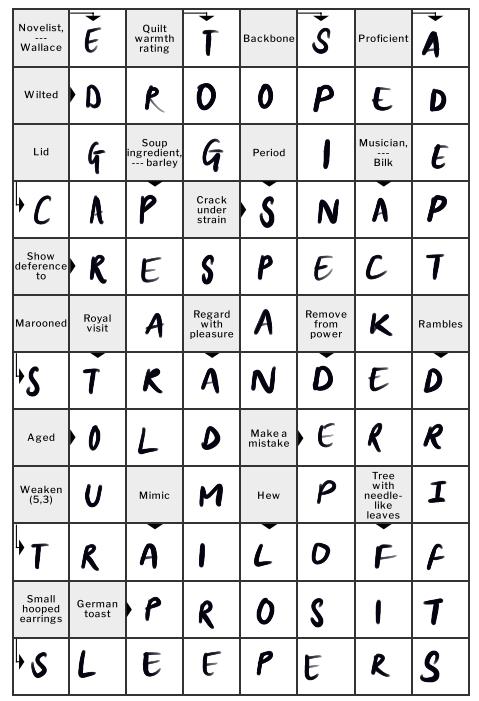
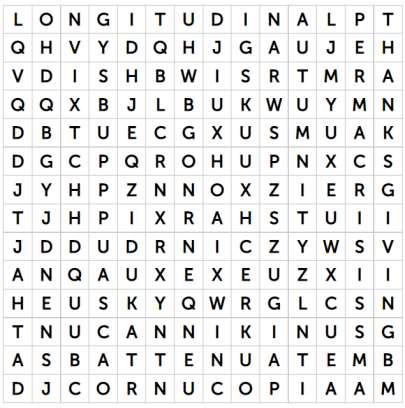
October's Crossword
Answers:
1. Ritualistic
2. Emetophobia
3. Dantopia
4. Friend
5. Dystopia
6. Chucky
7. Poltergeist
8.Hippopotomonstrosesquipedaliophobia
9. Macabre
10. Escalaphobia
SUSURROUS
AUTUMNITY
EQUINOX
PERMACRISIS
LONGITUDINAL
HERBERNACULUM
CORNUCOPIA
ATTENTUATE
THANKSGIVING
CANNIKIN
SUDOKU
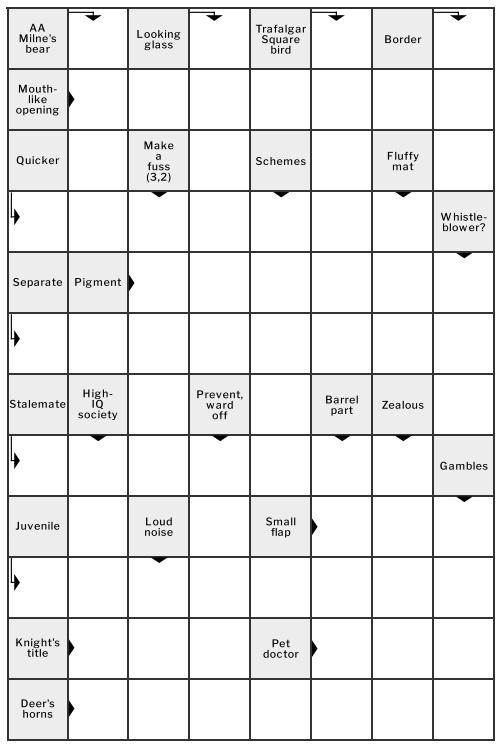


THE BOOMERANG BOARD
Avantika Bhowmik | Chair & Layout Director
Pablo Ruiz Delgado | Managing Editor

Elisa Uccello | Executive Editor
Katrina Joy Funk | Executive Editor
Sophie Hudson | Executive Editor
Hilde van Son | Exective Editor
Ida van Zwetselaar | Art Director
Kitty Bertrand | PR Manager
SWEDISH CROSSWORD
Boomerang uses wind energy printers
The Boomerang is a periodical newspaper. It comes out eight times a year. This is the first edition of the academic year.

